>
The modern market of fuel additives has more than one dozen species, and if we talk about composite compositions, then we are talking about hundreds of names. For a non-specialist it is quite difficult to understand this diversity, and, taking into account conflicting opinions about how effective their use is and whether they do not harm a car, the task of choice for a beginner becomes altogether difficult to solve. Meanwhile, most of these additives are designed to improve the quality of the process of burning gasoline or diesel fuel, and as an additional bonus - reducing the toxicity of the products of the combustion process of the fuel mixture.
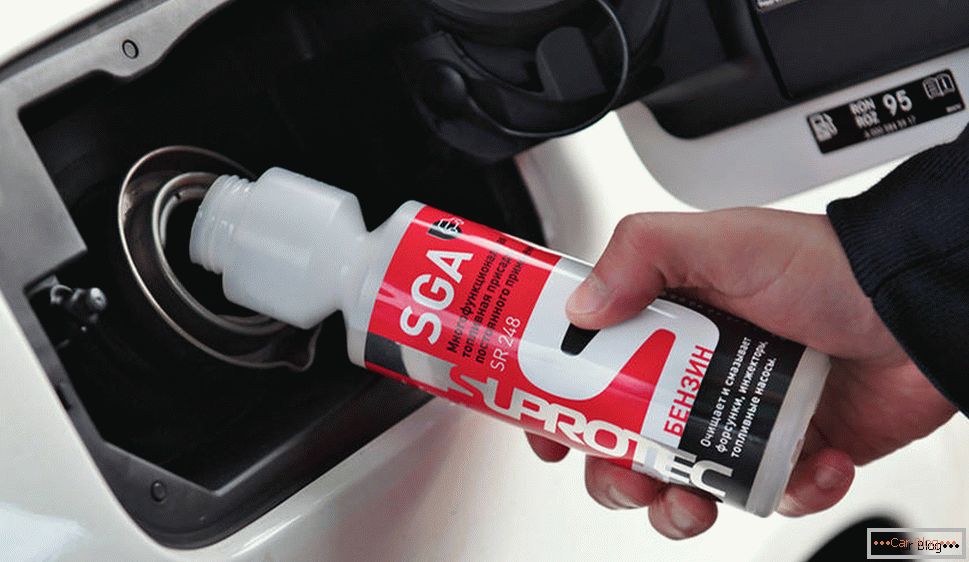
Recommendations on the choice of additives in gasoline.
Читать далее про то как выбрать присадки в бензин-->
Features of domestic fuel
The thoughtful car enthusiast must have heard a lot of information about fuel additives and, most likely, repeatedly thought about whether to try to use them, or better adhere to the principle of "safe and god saves." Meanwhile, it should be understood that gasoline is the result of processing very complex substances that are commonly referred to as the generalized term hydrocarbons. Fundamentally, there are no processing methods that allow commercially producing gasoline that does not contain various inclusions such as resinous substances. Even the most high-quality varieties contain about 10 - 100 mg. resinous substances per liter of fuel. And if we take into account that the conditions of technological processes at different refineries can vary greatly, the raw materials are often used differently, and a considerable part of domestic producers of gasoline works using a simplified technology, then it is not possible to speak of high quality fuel.
In terms of resin concentration, diesel fuel is almost ten times ahead of gasoline, and the resins are chemical compounds with a high content of acids, so they practically do not dissolve in a liquid medium and have the ability to easily accumulate on any metal surfaces. And this is the fuel tank, and other parts and components of the fuel system, and the combustion chamber of the engine. It is resinous inclusions, which have a low evaporation rate and therefore do not burn completely, are the main source of soot. These solid deposits are deposited:
- in the combustion chamber;
- in fuel injectors;
- in spark plugs;
- in the exhaust manifold;
- on piston rings;
- in the carburetor;
- in the fuel tank.
All this leads to a gradual decrease in engine acceleration, an increase in smoke, increased fuel consumption, increased exhaust emissions and other unpleasant consequences. Dealing with soot is difficult, but possible, and it is fuel additives that can play a decisive role in your war. Of course, you can refuse to use them, but be prepared for the fact that you will soon have to do a large-scale cleaning of all of the above, and this already draws on major repairs. It should be understood that gasoline additives are a medicine through which operational control and correction of fuel quality is carried out. And this happens by increasing the solubility of the resinous components present in the fuel, in order to prevent them from settling on the metal surface.
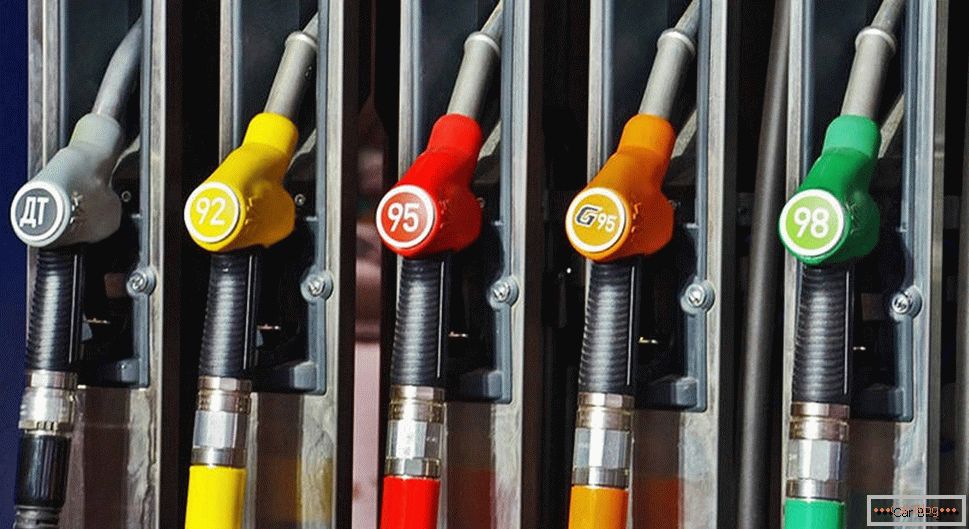
Moreover, some additives are able to dissolve the existing carbon, and some have a fine effect on the water that has entered the fuel tank (breaking it up into very small droplets in size that are not able to harm the combustion process). As you can see, the knowledge of what are additives for gasoline, just will not be superfluous, and we will try to fill this information gap. Note that fuel additives are most often already present in the fuel offered at gas stations, but there is very little information about this, so many car owners prefer to use fuel chemistry at their own peril and risk.
Fuel Additive Classification
Common in world practice is the division of additives for gasoline into 4 categories, depending on the purpose:
- dryers, moisture neutralizers, water removers - these and similar names are applicable to additives designed to remove water that has entered the fuel tank, leading it to the outside through the combustion chamber without deteriorating the process of burning the fuel mixture;
- injector cleaners, detergents / detergents are used primarily to clean the carbon and other injector contamination
- fuel catalysts, or octane correctors - additives designed to increase the power (acceleration) of the power unit, as well as reduce fuel consumption, which is achieved by increasing the main characteristics of gasoline - octane number;
- Universal additives are various combinations of the main species.
What specific additives to add to gasoline, decides the owner of the car, our task is to describe their purpose, principle of operation, advantages and disadvantages.
Cleansing Supplements
Injector cleaners are the means that makes it possible to rid the injector and valve nozzles of soot and tar without the need for disassembly and the use of additional equipment. Clogging up, the injector sprays gasoline not in the form of fine mist, but with interruptions, the jet turns out to be of lower quality and enters the combustion chamber at a speed less than the required one. A radical way to solve the problem is to visit the service station, where there are specialized tools and equipment for flushing the injector under pressure. However, the cost of this operation is quite high (about 3 - 4 thousand rubles).
The mentality of our people is such that they prefer to save here and now, choosing either an independent cleaning of the injector with dismantling of the ramp, or the use of cleaning additives, which cost almost an order of magnitude lower (400 - 500 rubles). It is clear that for the first option it is necessary to have “straight” hands and some kind of experience, as well as appropriate tools. Therefore, most prefer not to sweat and use an additive - just pour it into the tank. But it should be noted that the maximum effect will be achieved if the pollution of the fuel system is not critical.
In particular, with a mileage of between 10 and 20 thousand kilometers, the branded additive will be able to dissolve the existing deposit and gently withdraw it through the combustion chamber. What kind of additive to fill in gasoline in such cases? Most automakers offer their own proprietary formulations, including BMW, Audi, Toyota, VW, Mercedes, Skoda and other well-known brands, so if you have a foreign car, choose a brand-name additive.
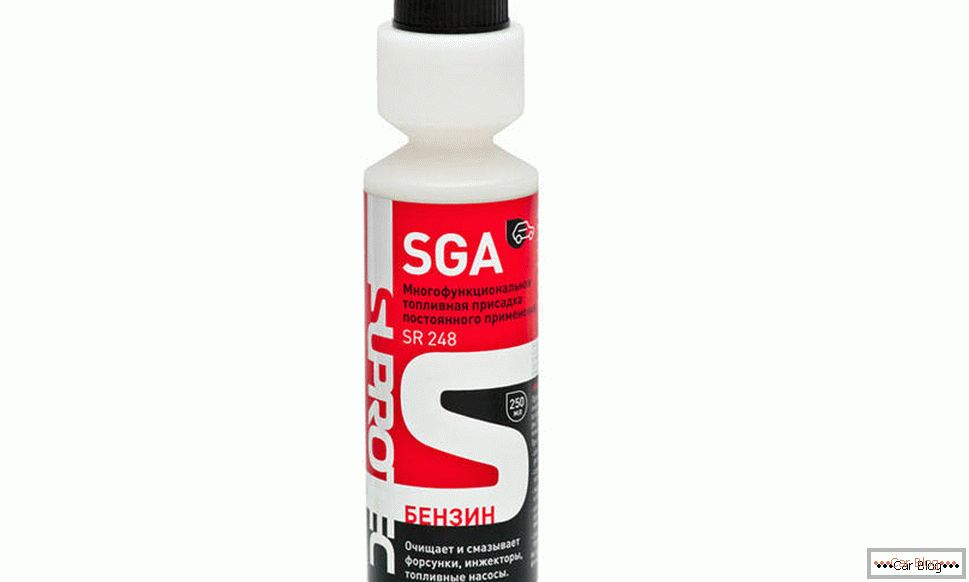
With a run of more than 100 thousand kilometers, the use of such compositions will not have the desired effect. Manufacturers mention this and do not hesitate. Moreover, many experts believe that for old cars cleaner may be harmful instead of good. The fact is that in a tank with such runs a whole layer of sediment probably splashes down at the bottom, consisting of all conceivable pollutants. This sediment does not enter the fuel line system under normal conditions, but if you add a cleaning additive to the gasoline, it will dissolve the suspension. And although most of the dirt will be delayed by the fuel filter, some of it will still fall into the nozzles, covering them with an even larger layer of soot.
By the way, in the winter, the addition of an injection cleaner to gasoline can provoke a complete clogging of the fuel filter screen. So owners of cars with high mileage do not use cleaning additives, in any case the positive effect of this will be minimal.
Dehydrating additives
How does water get into the fuel tank? This is not necessarily the sluggishness of the driver - probably every car owner refueled several times in the rain, snow, fog. In the end, very often condensate or water enters your fuel system with low-quality gasoline. In any case, the presence of water in the fuel tank is a serious drawback. Most of the troubles awaits you in the winter, when in cold weather the water can freeze up, completely clogging up with the mesh of the fuel filter. This will be enough so that you could not start, and such troubles occur, as a rule, at the most inappropriate moment - for example, when you are late for work. It will be useful to remind you that moisture is the main enemy of metal surfaces, and in the fuel system there are plenty of them besides a tank.
An ideal water neutralizer, consisting of 80 - 85% alcohol, should, mixing with gasoline, dissolve in the fuel all the water at the bottom of the tank. And already this mixture through the fuel lines enters the combustion chamber and then the water in its pure form is discharged through the exhaust pipe. Unfortunately, in practice, the additive-dehumidifiers remove only a small part of the water, especially if it has accumulated a lot. In other words, they are effective mainly on new cars. In the neglected case without disassembling the tank and most of the fuel system is not enough, otherwise the risk of water hammer will dominate your car until it becomes a reality. And then it will not be possible to manage with small means. What kind of drying additives are better for gasoline can be determined by examining the data of independent tests - there are more than enough of them recently presented on the Internet.
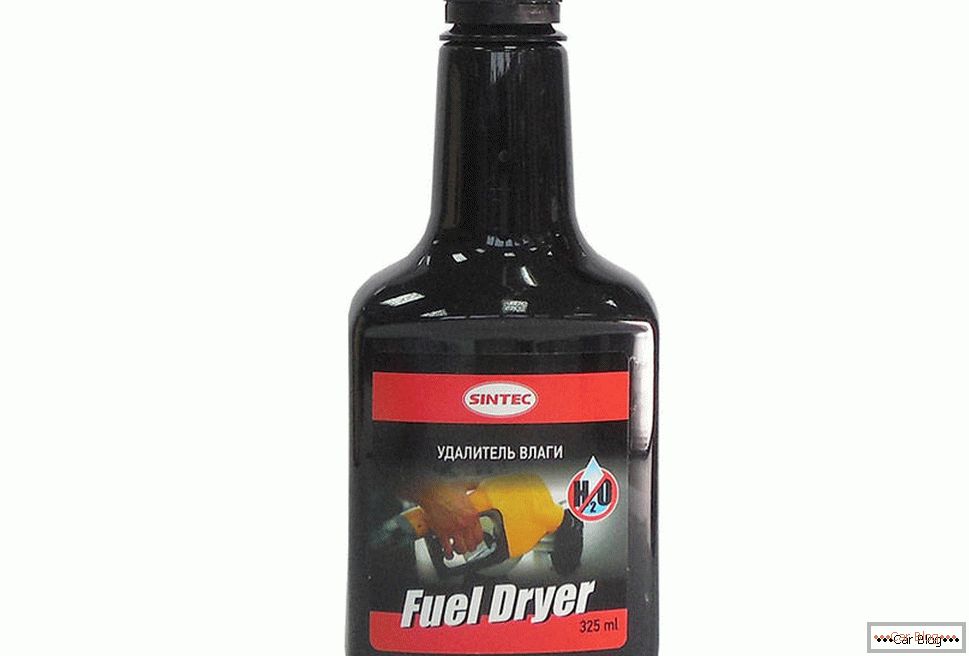
 Discounts for new cars! Profitable loan from 9.9% installments 0%
Discounts for new cars! Profitable loan from 9.9% installments 0%  adom.ru
adom.ru
Catalyst Additives
For many motorists, the fact that the higher the octane number of gasoline is, the better it is, is obvious. According to the theory, this is a wrong opinion - 76 petrol does not necessarily have low quality, rather the opposite. He just has a different purpose and the corresponding objective function. But the fact that gasoline sold at gas stations usually does not correspond to the declared characteristics, including in OCh, is hardly doubted, and this is by and large true. Therefore, the ability to increase the octane number, thereby reducing fuel consumption and increasing engine power, should not be ignored. If we talk about the composition of octane-corrective additives, they are 85 - 90% composed of ethers and simple monohydric alcohols (this does not mean that they consist of one atom!), And all the rest is allotropic carbon modifications.
In principle, it is the esters and alcohols that are the determining factor that affects the value of the octane number. And there is no tangible reason to use expensive additives to turn 92 gasoline into 95. Of course, if you make a long trip and, due to circumstances, were forced to refuel somewhere in the wilderness at a noname refueling, it is possible that the quality of gasoline will be so bad that the engine will start to detonate. In this case, the catalyst additive can actually help improve the quality of the fuel by several units. But the systematic use of such an additive is not economically feasible.
To make sure of this, we will make simple calculations. Typically, the cost of one bottle of octane-corrector, designed to increase the octane number of 150 liters of gasoline, is 500 - 600 rubles. Roughly speaking, we increase the cost of a liter of gasoline by 4 rubles. Why then make a fuss if you can just fill in the 95th, and it will be almost the same or even cheaper? It is also worth considering that manufacturers declare an increase in PTS by 5-7 units, in reality, the increase will be in the region of two units. That is, we can assume that you purchased instead of 95 gasoline 94, adding to 92 the recommended amount of additive.
Of course, such calculations have an error of the order of 5–8%, but in any case, the addition of additives to 95 gasoline on a regular basis, as already noted, is devoid of economic expediency.
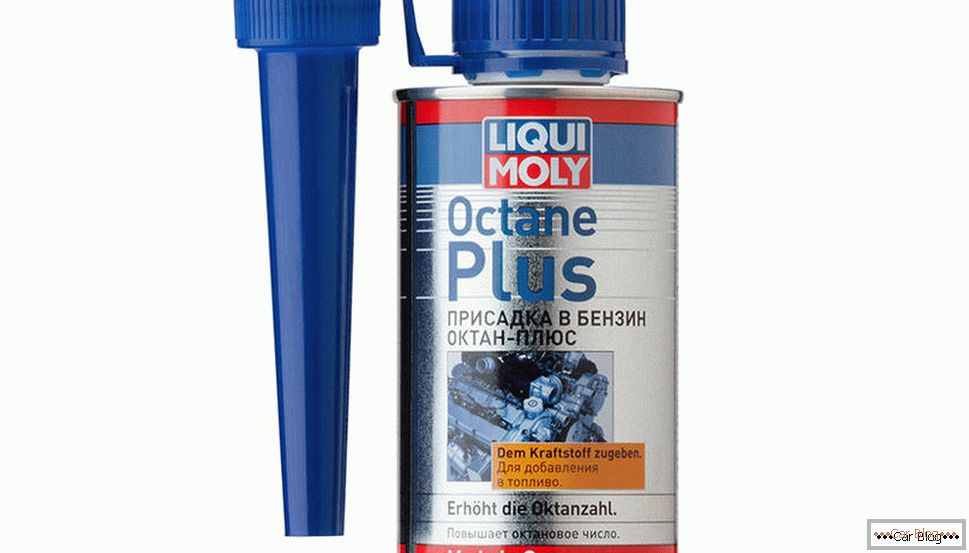
Universal Additives
Since the action of the three main classes of fuel additives is based on completely different physical processes, no one forbids mixing them in certain proportions in order to obtain a universal composition, which in theory can do everything at once. Such complex additives are commonly used to clean the entire fuel system, from the fuel tank to the intake valves, from the fuel lines to the combustion chamber. The cost of generic additives can vary widely, depending on the composition, so carefully read the label to make sure that you get the product with the characteristics you need and do not overpay for what you do not need.
Another nuance: the effect of cleaning additives is based on the intensification of the combustion of the air-fuel mixture, providing a protective effect on the formation of soot, and the actual cleaning ability of such additives cannot be called impressive. If we talk about the effect of universal compounds on catalytic converters, it is either minimal or absent altogether.
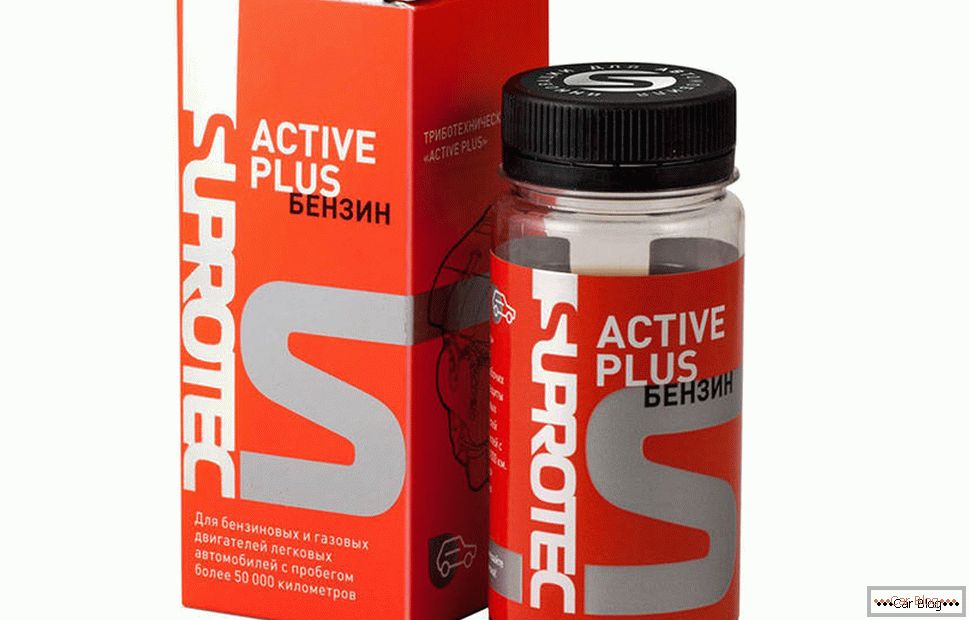
Other fuel additives
Most of them, besides a certain positive effect, have a considerable number of disadvantages, so we cannot recommend their use.
Ethyl
Полное химическое название этого вещества – тетраэтилсвинец. Его применяют для увеличения приёмистости двигателя и уменьшения его шумности, что особенно актуально для не совсем современных дизельных силовых агрегатов. Ethyl способен существенно улучшить качество топлива, одновременно увеличивая такой параметр, как стойкость бензина к самовоспламенению. Эта особенность этила часто используется для изготовления бензина-фальсификата. При этом тетраэтилсвинец представляет собой очень токсичное вещество, смертельное для живых организмов даже в незначительных количествах. Он обладает очень высокой текучестью, легко просачиваясь через самые маленькие отверстия. Кожа для него тоже не препятствие, поэтому с этой добавкой связываться не стоит.
Naphthalene
A pound of naphthalene can turn 10 liters of 92 gasoline into 95 liters - according to calculations, it increases the octane number by four units. However, its effect on the human body is no less dangerous: it has been proven that it contributes to the development of malignant neoplasms. In addition, with its systematic use of the naphthalene crystallizes, gradually clogging the filters and worsening the permeability of the hoses.
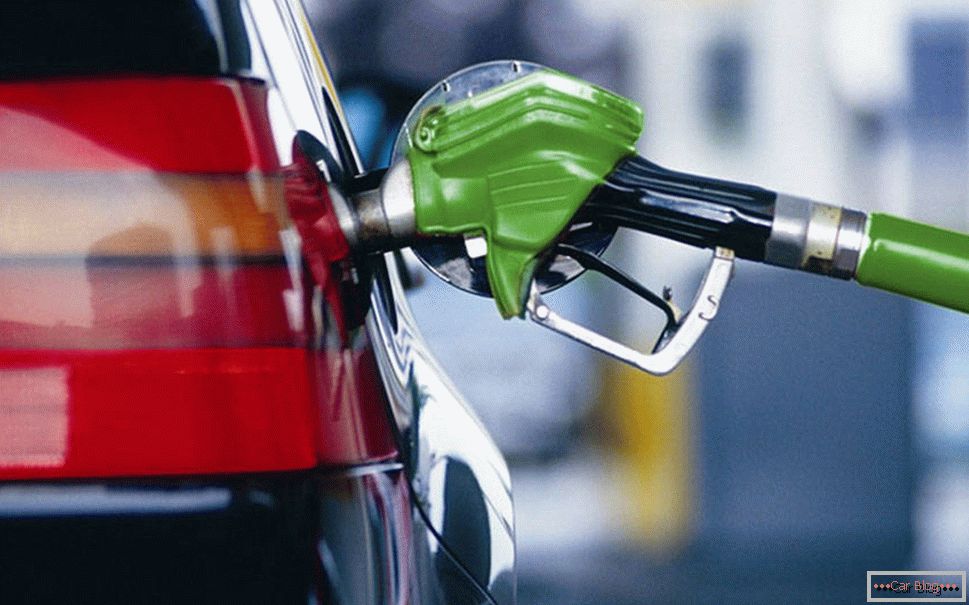
Ethanol
This is an ordinary technical alcohol that is capable of increasing the octane number of 10 liters of gasoline by eight units when 1 to 2 liters of ethanol is added to the fuel. Such an impact contributes to a more complete combustion of the fuel, as a result of which the efficiency of the motor increases, and with it the power increases proportionally. However, the systematic use of alcohol as an additive leads to the erosion of rubber pads. It should also be understood that if overdoing with ethanol, the octane number instead of an increase will demonstrate the opposite effect, a detonation will appear, accompanied by a knock of valves.
Acetone
In low dosages, methyl butyl ether, like alcohol, is capable of increasing PM. Usually it is already included in the composition of gasoline, so the independent addition of acetone can lead to the opposite effect due to the excess of its concentration. Another disadvantage of this additive is its ability to decompose, forming harmful organic compounds that pollute the fuel system and worsen exhaust parameters.
Manganese
This metal is also capable of increasing the octane number (depending on the concentration - by 3 to 6 units), but with prolonged use the neutralizer and the candles may suffer, and the power of the power unit will irreversibly decrease, and the color of the exhaust gases will change to dark gray.
Ferrocene
This organometallic compound is capable of increasing PTS by five units. Among the side effects of ferrocene are the formation of a red tint on the walls of the cylinders and on the candles, which negatively affects the engine acceleration.
Aromatic carbohydrates
Such representatives of the oil distillation process, such as toluene and benzene, make it possible to increase the octane number by 7–10 units, but because of their high corrosive ability, they quickly destroy all the rubber parts of the fuel system, contributing to the formation of corrosion on metal surfaces. If you overdo it with aromatic carbohydrates, especially if you pour them into low-quality gasoline, the risk of fuel spontaneous combustion increases due to a significant increase in the electrical conductivity of gasoline.
Methyl tertiary butyl ether
This substance is a class of ethers, but has a very high PTS (over 110 units). This is one of the most effective octane correctors, but exceeding the concentration in excess of one and a half liters of MTBE per 10 liters of gasoline leads to a noticeable drop in engine power, as well as to the appearance of NOx in the exhaust gas. Methyl tertiary butyl ether-enriched gasoline destroys seals and accelerates corrosion processes.
Monomethyl alanine
In small dosages (less than 100 ml. Per 10 liters of gasoline) reduces the detonation of the power unit, with virtually no side effects, however, exceeding the specified concentration causes the formation of soot and sediment on the valves with all the ensuing consequences.
In addition, it is a poison, deadly to humans.
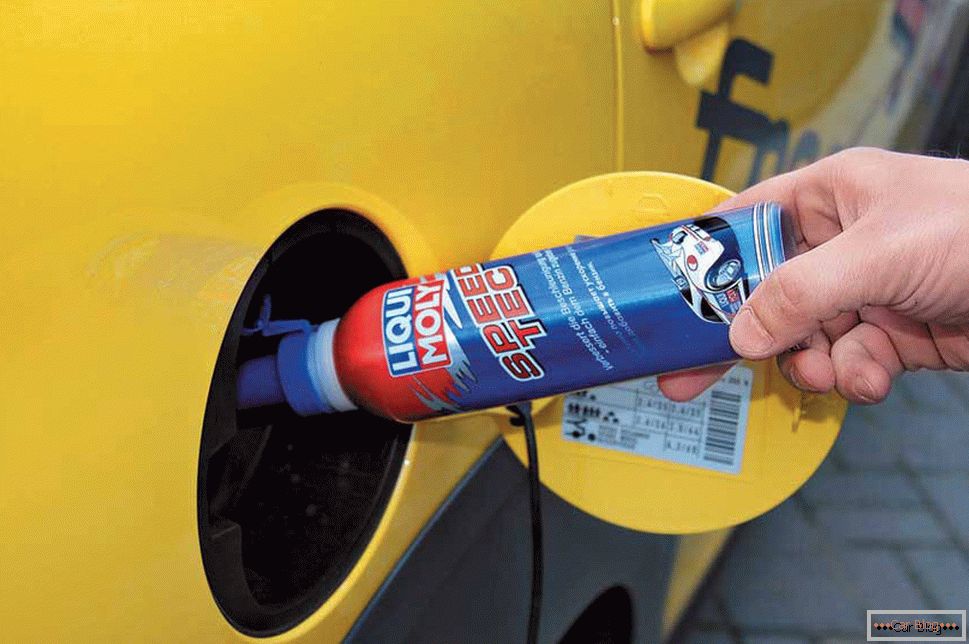
Some useful tips
The above information should give an overview of the types of additives and their effects on the fuel system. And our recommendations will help you avoid the most common mistakes when using these supplements:
- If you come across a fuel additive of an unknown type - do not even try to use it, despite the most enticing description and advice of sellers.
- If you use a certain additive for the first time - start with a minimum dose, make sure that the engine operating parameters have not deteriorated, and only then pour the dose recommended by the manufacturer.
- In most cases, the label indicates not only the dosage, but also the frequency of use of additives. If this information is not available - fill in the additive after hitting a minimum of 2,000 kilometers.
- Since gasoline additives are aggressive substances, it is necessary to work with them using personal protective equipment (glasses, gloves, rubber shoes, overalls). Many additives contain toxic compounds harmful to the human body.
- Try to limit the use of universal additives - it is better to buy funds aimed at achieving a certain goal. Believe me, the effectiveness of this method is much higher than the use of additives that supposedly can do everything, but do it with unimportant quality.
- It is best to pour the active substance not into the tank, but into the fuel canister. In this case, the probability of making a mistake with the dosage is significantly lower, and even the possibility of qualitative mixing of the enriched mixture will be more favorable.
Use or refuse to use additives in gasoline - you decide. But if you like to experiment, it is useful to remind you that you should carefully compare the possible benefits from their use and the risks to which you expose your car.



